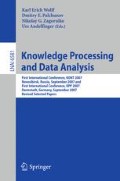Abstract
The paper presents a technology of ontology building for specialized Internet portals providing content-based access to scientific knowledge and information resources related to humanities. The information basis for such portals is formed by ontologies, which allows heterogeneous data and knowledge to be presented in a unified manner ensuring their relatedness. Based on the ontology, internal storages of the portal data are constructed and management of its information content, as well as navigation and search, are organized. To meet the portal objectives, the ontology should be well-structured and adequately present its problem and subject domains. Therefore the portal ontology is divided into the domain-independent ontologies and subject domain ontology. The technology of ontology building includes the methods of ontology building, the ontology description language and ontology editor. The methods of ontology building are defined by its structure and supported by the facilities of the ontology editor. The ontology description language and ontology editor are selected and designed in such a way that they are easy to understand and use for experts in humanities. The ontology editor is also designed taking into account its use in the distributed development of ontologies.
The authors are grateful to the Russian Foundation for the Humanities (grant 07-04-12149) for financial support of this work.
Access this chapter
Tax calculation will be finalised at checkout
Purchases are for personal use only
Preview
Unable to display preview. Download preview PDF.
References
Zagorulko, Y., Borovikova, O., Bulgakov, S., Sidorova, E.: Ontology-based approach to development of adjustable knowledge internet portal for support of research activity. Bull. of NCC. Ser.: Comput. Sci. (23), 45–56 (2005)
Gruber, T.R.: Toward Principles for the Design of Ontologies Used for Knowledge Sharing. International Journal of Human-Computer Studies 43(5-6), 907–928 (1995)
Guariano, N., Giaretta, P.: Ontologies and Knowledge Bases. Towards a Terminological Clarification. In: Towards Very Large Knowledge Bases: Knowledge Building and Knowledge Sharing, pp. 25–32. IOS Press, Amsterdam (1995)
Ushold, M., Gruninger, M.: Ontologies: Principles, Methods and Applications. Knowledge Engineering Review 11(2), 93–155 (1996)
Ushold, M., King, M.: Towards a Methodology for Building Ontologies. In: Proceedings of the IJCAI Workshop on Basic Ontological Issues in Knowledge Sharing, Montreal, Quebec, Canada, August 1995, pp. 6.1–6.10. AAAI Press, Menlo Park (1995)
Benjamins, V.R., Fensel, D.: Community is Knowledge! in (KA)2. In: Gaines, B.R., Musen, M.A. (eds.) Proceedings of the 11th Banff Knowledge Acquisition for Knowledge-based Systems Workshop, KAW 1998, Banff, Canada, April 1998, SRDG Publications, Department of Computer Science, University of Calgary, Calgary (1998), http://ksi.cpsc.ucalgary.ca/KAW/KAW98/benjamins1/
OWL Web Ontology Language Guide (2004), http://www.w3.org/TR/owl-guide/
Protege, http://protege.stanford.edu/
Zagorulko Yury, A., Popov Ivan, G., Kostov Yury, V.: Subdefinite Data Types and Constraints in Knowledge Representation Language. In: Joint Bulletin of the Novosibirsk Computing Center and Institute of Informatics Systems. Computer Science, vol. 16, pp. 153–170. NCC Publisher, Novosibirsk (2001)
Lenat, D.B., Guha, R.V.: Building large knowledge-based systems. Addison Wesley, Reading (1990)
Swartout, B., Ramesh, P., Knight, K., Russ, T.: Toward Distributed Use of Large-Scale Ontologies. In: Proceedings of Symposium on Ontological Engineering of AAAI, Stanford, California, pp. 138–148 (March 1997)
Stojanovic, L., Motik, B.: Ontology evolution within ontology editors. In: Proceedings of the OntoWeb-SIG3 Workshop at the 13th International Conference on Knowledge Engineering and Knowledge Management (EKAW), pp. 53–62 (September 2002)
Using Dublin Core, http://dublincore.org/documents/usageguide/
Kholushkin, Y.P., Grazhdannikov, E.D.: Systemic classification of archaeological science (Elementary introduction in science of science), Novosibirsk (2000) (in Russian)
Author information
Authors and Affiliations
Editor information
Editors and Affiliations
Rights and permissions
Copyright information
© 2011 Springer-Verlag Berlin Heidelberg
About this paper
Cite this paper
Zagorulko, Y., Borovikova, O. (2011). Technology of Ontology Building for Knowledge Portals on Humanities. In: Wolff, K.E., Palchunov, D.E., Zagoruiko, N.G., Andelfinger, U. (eds) Knowledge Processing and Data Analysis. KPP KONT 2007 2007. Lecture Notes in Computer Science(), vol 6581. Springer, Berlin, Heidelberg. https://doi.org/10.1007/978-3-642-22140-8_13
Download citation
DOI: https://doi.org/10.1007/978-3-642-22140-8_13
Publisher Name: Springer, Berlin, Heidelberg
Print ISBN: 978-3-642-22139-2
Online ISBN: 978-3-642-22140-8
eBook Packages: Computer ScienceComputer Science (R0)

